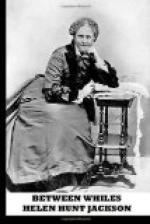“He’s takin’ it in quick the way the bairn’s got them a’ in hand,” thought John. “If only she can hold hersel’ cool now!”
No danger. Bel was not the one to lose a battle by appearing to quail in the outset, however clearly she might see herself outnumbered. And sympathetic and eager glances from her constables, Archie and Sandy, told her that they were all ready for the fray. These glances Sandy Bruce chanced to intercept, and they heightened his bewilderment. To Archie McLeod he was by no means a stranger, having had occasion more than once to deal with him, boy as he was, for complications with riotous misdoings. He had happened to know, also, that it was Archie McLeod who had been head and front of the last year’s revolt in the school,—the one boy that no teacher hitherto had been able to control. And here stood Archie McLeod, rising in his place, leader of the form, glancing down on the boys around him with the eye of a general, watching the teacher’s eye, meanwhile, as a dog watches for his master’s signal.
And the orderly yet alert and joyously eager expression of the whole school,—it had so much the look of a miracle to Sandy Bruce’s eye, that, not having been for years accustomed to the restraint and dignity of school visitors, of technical official, he was on the point of giving a loud whistle of astonishment Luckily recollecting himself in time, he smothered the whistle and the “Whew! what’s all this?” which had been on his tongue’s end, in a vigorous and unnecessary blowing of his nose. And before that was over, and his eyes well wiped, there stood the whole school on its feet before him, and the room ringing with such a chorus as was never heard in a Prince Edward Island school-room before. This completed his bewilderment, and swallowed it up in delight. If Sandy Bruce had an overmastering passion in his rugged nature, it was for music. To the sound of the bag-pipes he had often said he would march to death and “not know it for dyin’.” The drum and the fife could draw him as quickly now as when he was a boy, and the sweet singing of a woman’s voice was all the token he wanted of the certainty of heaven and the existence of angels.
When Little Bel’s clear, flute-like soprano notes rang out, carrying along the fifty young voices she led, Sandy jumped up on his feet, waving his hand, in a sudden heat of excitement, right and left; and looking swiftly all about him on the platform, he said: “It’s not sittin’ we’es take such welcome as this, my neebors!” Each man and woman there, catching the quick contagion, rose; and it was a tumultuous crowd of glowing faces that pressed forward around the piano as the singing went on,—fathers, mothers, rustics, all; and the children, pleased and astonished, sang better than ever, and when the chorus was ended it was some minutes before all was quiet.
Many things had been settled in that few minutes. John McDonald’s heart was at rest. “The music’ll carry a’ before it, no matter if they do make a failure here ‘n’ there,” he thought. “The bairn is a’ right.” The mother’s heart was at rest also.




